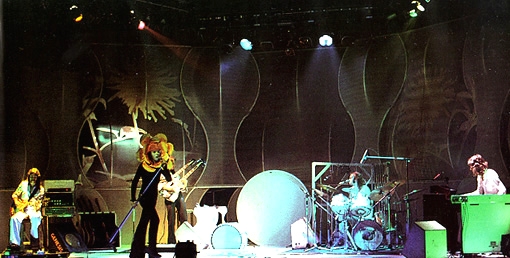/PAlogo_v2.gif) |
|
Post Reply 
|
Page <1234 5> |
| Author | ||||||||||
CCVP 
Prog Reviewer 

Joined: September 15 2007 Location: Vitória, Brasil Status: Offline Points: 7971 |
 Posted: June 19 2008 at 11:25 Posted: June 19 2008 at 11:25 |
|||||||||
|
/\
Mike, you meant labels like progressive rock, hard rock and progressive metal right? Because Death metal was properly coined by Possessed and black metal was properly coined by Venom. . . . Strangely enough, Spooky Tooth is labeled progressive rock on Wikipedia . . . . http://en.wikipedia.org/wiki/Spooky_Tooth Edited by CCVP - June 19 2008 at 11:25 |
||||||||||
  
|
||||||||||
 |
||||||||||
StyLaZyn 
Forum Senior Member 

Joined: November 22 2005 Location: United States Status: Offline Points: 4079 |
 Posted: June 19 2008 at 11:23 Posted: June 19 2008 at 11:23 |
|||||||||
I want to interject here. It was with Rush's second release, the first with monster Peart, that they headed into Prog. By-Tor and the Snow Dog was, IMO, a creation with inadvertent Prog elements. Yes, they were hard rock, but they turned the corner with this release. Only those well versed in their material witnessed this. Those that only knew Fly By Night, the song, would see them as merely hard rock.
They contributed heavily to the future of what would be Prog Metal. I think investigating some current Prog Metal band inspirations will show this.
|
||||||||||

|
||||||||||
 |
||||||||||
MikeEnRegalia 
Special Collaborator 

Honorary Collaborator Joined: April 22 2005 Location: Sweden Status: Offline Points: 20667 |
 Posted: June 19 2008 at 10:46 Posted: June 19 2008 at 10:46 |
|||||||||
|
The problem is that labels are not properly defined ... they're "coined", and usually by people with no certified (sic) background in music, such as fans or reviewers. They lump bands or albums together because in their opinion they're similar, based on whatever criteria they see fit. I guess we both have the same motive: We attempt to unify the criteria used to define these genre labels. But since the way they're commonly used conflicts with this scientific approach, our attempts might be doomed to fail.
Maybe the best solution is to come up with a brand new label, one that hasn't been used before. My suggestion: "difolkaw". Yeah, "Difolkaw Rock" and "Difolkaw Metal", that will clear things up!  |
||||||||||
 |
||||||||||
Certif1ed 
Special Collaborator 

Honorary Collaborator Joined: April 08 2004 Location: England Status: Offline Points: 7559 |
 Posted: June 19 2008 at 10:37 Posted: June 19 2008 at 10:37 |
|||||||||
|
The labels themselves have nothing to do with scientific reasoning, it's true, but, under analysis, there are clear connections between groups that tend to get labelled a certain way. People want to label and classify, which is why there are so many labels around.
Generally, this is more true of popular music until the end of the last millenium - it is a very recent thing to get as fuzzy as it currently is, for which the Internet is mainly to blame. There have always been fuzzy edges in defining any type of music, we're not talking about Euclidean geometry or anything as precise as that.
Fuzzy logic is as good a term as any to describe what I'm thinking about.
|
||||||||||
|
The important thing is not to stop questioning.
|
||||||||||
 |
||||||||||
MikeEnRegalia 
Special Collaborator 

Honorary Collaborator Joined: April 22 2005 Location: Sweden Status: Offline Points: 20667 |
 Posted: June 19 2008 at 08:11 Posted: June 19 2008 at 08:11 |
|||||||||
|
^ these labels have little or nothing to do with scientific reasoning. That's one of the reasons why on my website I'm trying to move from complex genre labels to simple, clearly defined tags. Of course some of the "fuzzy" labels are difficult to split ... I'm not sure if I can find a set of simple tags which you could use to construct the genre label "metal" with. But it can't hurt to try!
|
||||||||||
 |
||||||||||
Certif1ed 
Special Collaborator 

Honorary Collaborator Joined: April 08 2004 Location: England Status: Offline Points: 7559 |
 Posted: June 19 2008 at 07:52 Posted: June 19 2008 at 07:52 |
|||||||||
|
Re: Rush - I suppose it must be a geographical thing.
Iron Maiden were viewed in some areas as Progressive, but not in their home country.
Rush were viewed as Progressive - but crucially got lumped in with metal, as they were to metal to be Prog Rock. This might not have been the case everywhere on earth.
The point is, that there's a reason Rush were considered this way - all this discussion of labels sticking is bogus - I'm trying to get away from labels and into essence - REALITY.
The line in Steppenwolf's song is so often quoted it's not funny - but yes, that music is considered Heavy Metal by some - and who is to say they're wrong?
Before Steppenwolf released that song, there was an album released in 1967, which featured one of the heaviest bands of the time, Art, who later became Spooky Tooth, who created stuff that sounds like Deep Purple, Led Zeppelin and Black Sabbath (who used one of Spooky Tooth's 1968 riffs on "Master of Reality", IIRC), before those bands released anything. A song from that same album was covered by Judas Priest - famously, as it got them into trouble. There is no question that Judas Priest are Heavy Metal, yet they did not change the song (apart from allegedly hiding messages in it...
The album I refer to is called Hapshash and the Coloured Coat, featuring the Human Host and the Heavy Metal Kids (Art). Heavy Metal refers to the music they played, and is the first reference I know of in popular music.
It's also true to say, as I pointed out in my "What is Prog?" blog, that the first released album to refer to the music contained on it as "Progressive Rock" is Eclection's self-titled debut - yet who else has even heard of that, let alone heard it?
This discussion has changed to "What is Heavy Metal?" - and I feel another blog coming on (as if I didn't have enough in progress...).
If you're going to classify, you need to identify more explicit ways of identifying it, rather than succumbing to pressure from what is felt to be "popular" opinion.
Imagine if popular opinion was that humans couldn't possibly be related to apes... would scientists agree? Edited by Certif1ed - June 19 2008 at 07:55 |
||||||||||
|
The important thing is not to stop questioning.
|
||||||||||
 |
||||||||||
MikeEnRegalia 
Special Collaborator 

Honorary Collaborator Joined: April 22 2005 Location: Sweden Status: Offline Points: 20667 |
 Posted: June 19 2008 at 07:25 Posted: June 19 2008 at 07:25 |
|||||||||
I'm to young to know first hand, but from the various discussions I gather that there are two major theories: One defines that everything as heavy as Steppenwolf's Born to be Wild is metal (consider the line "heavy metal thunder" ...). The other one defines this type of music as "hard rock". I belong to the latter (obviously), and generally the younger people are, the more they'll tend to choose "hard rock" as a label for those bands since they grew up with modern metal of the 1980s. Of course there's a third alternative: Instead of "hard rock" you could say "classic metal", or "heavy metal". But it's all a bit ambiguous no matter how you put it. |
||||||||||
 |
||||||||||
CCVP 
Prog Reviewer 

Joined: September 15 2007 Location: Vitória, Brasil Status: Offline Points: 7971 |
 Posted: June 19 2008 at 07:16 Posted: June 19 2008 at 07:16 |
|||||||||
|
What the?
As far as i know and as far as anyone that i know who is old enough to have lived that period Rush was NOT a progressive rock band neither a progressive metal one (what the hell?), just a terrific HARD ROCK band. It just happens that people who lived when history is in the making don't know the exact outcome of things and, about Rush, that was what happened. some years later (i think on the early 90's, already in internet chat things) Rush's classification changed widely to progressive rock wile it was still a hard rock band, which was quite reasonable since they for sure had some of the progressive rock elements. Nowadays its classification is changing again to progressive metal. People, we HAVE to remember that, if we are going to change Rush's classification we'd better change also Deep Purple's and Led Zeppelin's to metal and also keep in mind that the measuring stick for old school metal is Black Sabbath. Come on, think about it: if Rush indeed was a progressive metal band, they would not had only invented progressive metal, but also they would be one of the inventors of metal itself.
i wish i could have thought that, since it falls right into what i just said: some classifications are just forced, like putting Rush in the prog metal genre. Just let it be where it belongs: the hard rock session (and occasionally on the prog rock  ). ).
|
||||||||||
  
|
||||||||||
 |
||||||||||
The T 
Special Collaborator 

Honorary Collaborator Joined: October 16 2006 Location: FL, USA Status: Offline Points: 17493 |
 Posted: June 19 2008 at 00:05 Posted: June 19 2008 at 00:05 |
|||||||||
It will take me some time... But I promise I'll bring Steven Seagal into this discussion...
|
||||||||||

|
||||||||||
 |
||||||||||
preqT0THEseq7 
Forum Groupie 
Joined: March 02 2008 Location: Pominville Status: Offline Points: 94 |
 Posted: June 18 2008 at 23:22 Posted: June 18 2008 at 23:22 |
|||||||||
Agreed  |
||||||||||
 |
||||||||||
micky 
Special Collaborator 

Honorary Collaborator Joined: October 02 2005 Location: . Status: Offline Points: 46828 |
 Posted: June 18 2008 at 22:01 Posted: June 18 2008 at 22:01 |
|||||||||
hhahha... f**king A.... post of the week right there.... anyone who can work a Bruce Lee analogy into a Prog Metal thread.... is truly God on Earth for the week   |
||||||||||
|
The Pedro and Micky Experience - When one no longer requires psychotropics to trip
|
||||||||||
 |
||||||||||
Ivan_Melgar_M 
Special Collaborator 
Honorary Collaborator Joined: April 27 2004 Location: Peru Status: Offline Points: 19535 |
 Posted: June 18 2008 at 21:35 Posted: June 18 2008 at 21:35 |
|||||||||
Edited by Ivan_Melgar_M - June 18 2008 at 21:40 |
||||||||||

|
||||||||||
 |
||||||||||
debrewguy 
Special Collaborator 
Honorary Collaborator Joined: April 30 2007 Location: Canada Status: Offline Points: 3596 |
 Posted: June 18 2008 at 20:27 Posted: June 18 2008 at 20:27 |
|||||||||
|
A few comments here
First, that quote from Emmerson - Does that mean we eliminate Krautrock from PA ? Oh, wait, that music is not repetitive, it is "droning". Or as they say in some quarters - prog music means not having to make up your mind as to what song you're playing (now you hear it, now you don't!) Second, prog metal is doomed because it is associated with metal. Metal is associated with noise. Noise is associated with RIO/Avant-Garde and Krautrock, therefore Prog Metal is not prog. Third - Prog Metal can't be prog 'cause there are loud guitars and screaming singers. Fourth - Keyboards are necessary for a band to be considered prog ? Fifth - No , really , keyboards are necessary for a band to be prog ? Sixth - Can someone stop that ringing ?///} |
||||||||||
|
"Here I am talking to some of the smartest people in the world and I didn't even notice,” Lieutenant Columbo, episode The Bye-Bye Sky-High I.Q. Murder Case.
|
||||||||||
 |
||||||||||
MikeEnRegalia 
Special Collaborator 

Honorary Collaborator Joined: April 22 2005 Location: Sweden Status: Offline Points: 20667 |
 Posted: June 18 2008 at 06:43 Posted: June 18 2008 at 06:43 |
|||||||||
That's actually a very nice analogy. There are essentially two aspects colliding: The style and the approach. Followers can either copy the original style, or develop new styles using the approach of the original artists. The former is more easily recognisable as being similar to the original, especially by people without a musical background. The latter is more interesting and rewarding to check out, but also much harder to recognize or identify since it requires in-depth knowledge. It's surely quite difficult for someone who has never played an instrument or studied music theory to indentify concepts like Counter-Point or modal scales, cadenzas etc. in a piece of music, let alone the intricate form/structure required by Certif1ed's definition. In effect, his definition is quite radical, and something with which I sympathize, but it would also alienate many "progheads" which are more used to comparing styles and simple elements. In a nutshell by his definition Dream Theater would be replaced with Metallica ...  Edited by MikeEnRegalia - June 19 2008 at 02:53 |
||||||||||
 |
||||||||||
MikeEnRegalia 
Special Collaborator 

Honorary Collaborator Joined: April 22 2005 Location: Sweden Status: Offline Points: 20667 |
 Posted: June 18 2008 at 06:34 Posted: June 18 2008 at 06:34 |
|||||||||
Obviously that label did not "stick", otherwise a different one would have been chosen for the bands which now carry it, since it would have already been "taken". I don't think that anyone was rewriting history ... the label simply wasn't used widely enough for bands like Rush to *become* history.
I disagree. Of course you could rewrite a piece which is in 7/4 to be in 4/4 instead. But it would not be the same piece anymore. Whether the time signature (or change of it) is an important element or superficial - or in other words: how much it adds to the substance of the piece - can only be determined individually, looking at the whole track as a piece of art. Obvious example: Take 5. Take away the 5/4 ... of course it would work, but it wouldn't be the same anymore. Or consider Pink Floyd - Money. Take Steve Vai's highly energetic track "Kill the Guy with the Ball" ... it has a passage where the drummer deliberately gets out of sync with the band by one 16th note for each bar for like 4 bars until they get in sync again (if I remember it correctly). You absolutely can't take that away from the track, since it symbolises the chase (of the guy with the ball). It's essential.
Who are considered to be a progressive band. 
Now you're throwing everything together. Dream Theater vs. Rush is not a case of Prog vs. Non-Prog, but of Metal vs. Hard Rock. You're also welcome to calling Rush "Prog Metal" if you feel that "Metal" should include every style between Steppenwolf and Sepultura ... I simply think that in the context of what's commonly called "Prog Metal" we're talking about Post-NWOBHM. And for the record: In my book Metallica are progressive (as you must know by now) ... it's just their *style* which is very different from the typical Prog Metal bands. But on an album per album base Master of Puppets definitely deserves to be called "Prog Metal" IMHO.
"Prog" is difficult to grasp. It's something which you can't easily define. Your approach at defining it is certainly valid, in my opinion it's simply not complete. It doesn't cover all the bands which are commonly called "Prog". One fact we know is that Dream Theater are Prog. Now, maybe I'll take the time to define how Dream Theater are different from "normal" metal bands, and these differences might then be used as an indication that something might be Prog. Of course you can fling insults at me - intentional or not, words like "poor" or "garbage" don't exactly sound friendly - but whatever you do, Dream Theater are Prog. It's as simple as that ... if you disagree, you'll have to find another label to reference what you mean by "Prog".
That's a misunderstanding. I simply meant that we should be able to mention that something is difficult to play without others deducing that that alone is sufficient for us to call something Prog. It is a strong factor, but it needs to be accompanied by other elements/trademarks. For example, especially in genres like Thrash or Death the level of difficulty is generally high. If then other elements are added, like concept, jazz elements, epic structures, experimentality/avant-garde (weird things) etc. ... then something *might* be prog, but there are no definitive rules, there is no "prog formula". |
||||||||||
 |
||||||||||
Atavachron 
Special Collaborator 

Honorary Collaborator Joined: September 30 2006 Location: Pearland Status: Offline Points: 64665 |
 Posted: June 18 2008 at 04:18 Posted: June 18 2008 at 04:18 |
|||||||||
|
It reminds me a little of the dilemma Bruce Lee's followers had after he died. The form of martial art he developed and taught, Jeet Kune Do, was designed to be always evolving, fluid, and able to adapt to any opponent or situation.. essentially a progressive fighting style, a 'way of no way' as he put it. But over the years as his approach was taught to others, it became a rigid system with rules and techniques never meant to be adhered to. Sorry, had to slip in the martial arts analogy
 |
||||||||||
 |
||||||||||
Certif1ed 
Special Collaborator 

Honorary Collaborator Joined: April 08 2004 Location: England Status: Offline Points: 7559 |
 Posted: June 18 2008 at 04:04 Posted: June 18 2008 at 04:04 |
|||||||||
That is what we called them back in 1979 - and we called Rush Prog Metal first, so that gives us a fair claim to the title
Not everyone did, for sure (ie people not familiar with their music, or didn't care, etc.) - but Rush were lumped in with Yes and Genesis et al as Progressive Music, but it was recognised that their music was more metal than rock, and clearly different to Prog Rock, because of the riffs so Progressive Metal it was.
I agree with Dick Heath - the kiddies are rewriting history again...
Everyone has their own perspective - but I think the difference between elemental differences and fundamental differences in musical style has been made clear now.
I acknowledge Dream Theater's technical mastery of their instruments.
Time signature changes are incidental - and elemental too. Not every piece of Prog has multiple time changes - it's just not that important. It does happen more often in Prog, that is true - but this is just a way of describing the music, not identifying it.
Long-drawn episodic songwriting is also a characteristic - it simply does not happen 100% of the time in Prog and does not define it any more than it defines psychedelia or Classical music, in which it also happens a lot.
Hold on - technical mastery, long, episodic songs, tempo changes - sounds a LOT like Rush to me.
The confusion I was referring to in my initial blog is caused by looking at the building blocks in this way, and is why it is a nonsense to consider Dream Theater a Prog Metal band, but not Metallica or Rush.
Dream Theater's importance lies in reawakening people to Prog Metal - and full kudos to them for doing that - but not in inventing it.
You're not going to get a good or focussed picture if you use poorly-defined building blocks - garbage in, garbage out.
Er...
...not sure what you're accusing me of here, but it looks like you're accusing me of saying the same thing twice - for which crime I apologise.
One should never repeat oneself in public... Edited by Certif1ed - June 18 2008 at 04:21 |
||||||||||
|
The important thing is not to stop questioning.
|
||||||||||
 |
||||||||||
MikeEnRegalia 
Special Collaborator 

Honorary Collaborator Joined: April 22 2005 Location: Sweden Status: Offline Points: 20667 |
 Posted: June 18 2008 at 03:22 Posted: June 18 2008 at 03:22 |
|||||||||
Yes, they did re-invent music in their own way. Their albums sound unlike anything that was recorded before. Of course if you completely ignore the technical mastery, time signature changes, long-drawn episodic songwriting etc. then I can understand your problems with accepting them as something unique ... but IMO you have to look at the whole picture and not conveniently leave out aspects which interfere with your theory.
Now come on, a few posts ago you said yourself that progressive music is often difficult to play. It doesn't have to be, but it simply often is. |
||||||||||
 |
||||||||||
Ivan_Melgar_M 
Special Collaborator 
Honorary Collaborator Joined: April 27 2004 Location: Peru Status: Offline Points: 19535 |
 Posted: June 17 2008 at 16:42 Posted: June 17 2008 at 16:42 |
|||||||||
|
||||||||||

|
||||||||||
 |
||||||||||
MikeEnRegalia 
Special Collaborator 

Honorary Collaborator Joined: April 22 2005 Location: Sweden Status: Offline Points: 20667 |
 Posted: June 17 2008 at 10:23 Posted: June 17 2008 at 10:23 |
|||||||||
Rush are not prog metal ... not even close. In my book it all started to take form around 1988/1989, with the Dream Theater debut and Fates Warning - Perfect Symmetry. Of course you don't have to agree ... but IMO those albums are for Prog Metal what Genesis - Foxtrot and Yes - CttE are for Prog Rock!
|
||||||||||
 |
||||||||||
Post Reply 
|
Page <1234 5> |
| Forum Jump | Forum Permissions  You cannot post new topics in this forum You cannot reply to topics in this forum You cannot delete your posts in this forum You cannot edit your posts in this forum You cannot create polls in this forum You cannot vote in polls in this forum |